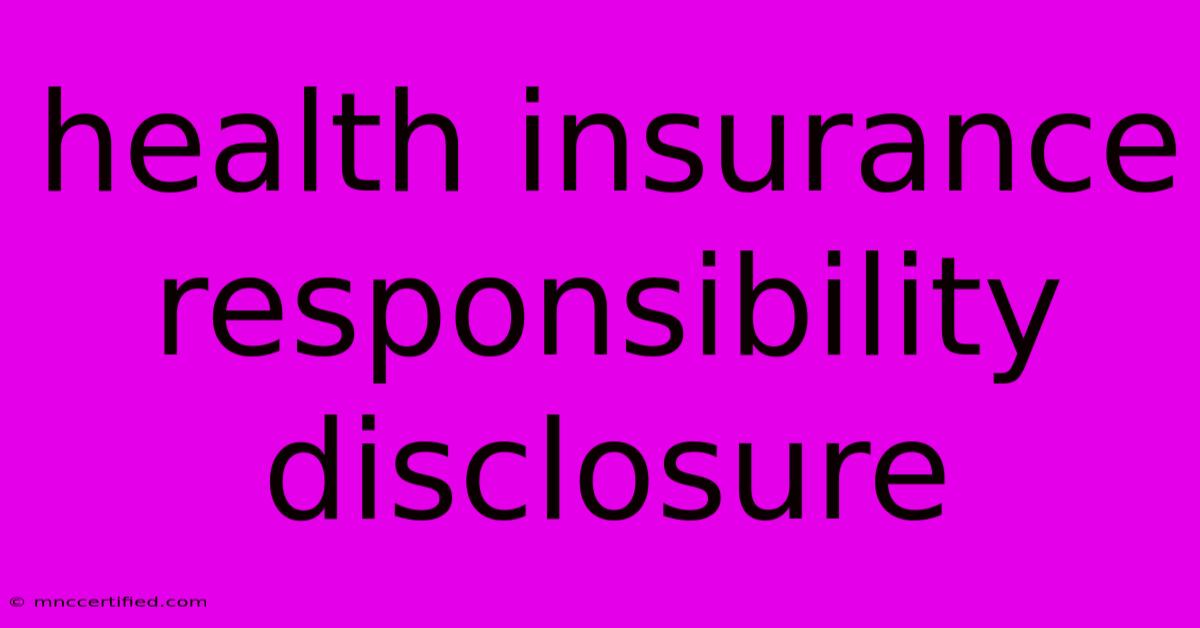Health Insurance Responsibility Disclosure

Table of Contents
Understanding Your Health Insurance Responsibilities: A Comprehensive Guide
Navigating the world of health insurance can feel overwhelming, especially when it comes to understanding your responsibilities as a policyholder. Knowing your obligations is crucial to avoid unexpected costs and ensure you receive the best possible care. This comprehensive guide will break down the essential aspects of health insurance responsibility disclosure, empowering you to be a proactive and informed healthcare consumer.
The Importance of Responsibility Disclosure
Health insurance companies, like any other businesses, have specific rules and regulations that policyholders must adhere to. These rules, outlined in your insurance policy, define your responsibilities as a member. Understanding these responsibilities is essential for several reasons:
- Avoiding Financial Burdens: Failing to fulfill your responsibilities can lead to denied claims, higher premiums, or even cancellation of your policy.
- Ensuring Timely and Efficient Care: By understanding your role in the process, you can avoid delays and ensure your healthcare needs are met promptly.
- Building a Strong Relationship with Your Insurer: Demonstrating responsibility builds trust and can help you navigate any future issues or inquiries smoothly.
Key Responsibilities as a Health Insurance Policyholder
1. Payment of Premiums:
- Prompt and Regular Payment: Your most fundamental responsibility is to pay your premiums on time. This ensures your policy remains active and covers you for healthcare expenses.
- Understanding Your Billing Cycle: Familiarize yourself with your insurer's billing cycle and payment methods to avoid late fees or interruptions in coverage.
- Contacting Your Insurer for Payment Issues: If you encounter financial difficulties, reach out to your insurer to discuss potential payment options or hardship programs.
2. Providing Accurate Information:
- Application Process: Be honest and accurate when filling out your insurance application. Any inaccuracies can lead to policy denial or even fraud accusations.
- Medical Records: Be transparent about your medical history and current health conditions. This helps your insurer assess your risks and provide appropriate coverage.
- Claim Submissions: Provide complete and accurate information when filing claims. This includes details about the medical service, provider, and any supporting documentation.
3. Understanding Your Policy:
- Reviewing Your Policy Thoroughly: Read your policy carefully to understand your coverage, limitations, and specific responsibilities.
- Familiarizing Yourself with Terminology: Become comfortable with insurance terminology like "deductible," "co-pay," "co-insurance," and "out-of-pocket maximum."
- Asking Questions: Don't hesitate to contact your insurer if you have questions about your policy or your coverage.
4. Using Your Policy Responsibly:
- Understanding Your Network: Know your insurance network and use providers within it to maximize your coverage and minimize out-of-pocket costs.
- Choosing the Right Care: Consult with your primary care physician to determine the most appropriate level of care for your needs.
- Obtaining Pre-authorization for Certain Services: Some procedures may require pre-authorization from your insurer. Follow the guidelines to ensure coverage.
5. Staying Informed:
- Changes in Coverage: Be aware of any policy changes or updates from your insurer. You may receive notifications via mail or email.
- New Treatments and Technologies: Keep informed about advancements in healthcare and their potential impact on your coverage.
- Industry Updates: Stay current on changes in the health insurance industry, such as new legislation or regulations.
Consequences of Not Meeting Your Responsibilities
- Denial of Claims: If you fail to provide accurate information or follow policy guidelines, your claims could be denied.
- Increased Premiums: Non-payment or fraudulent activities can lead to higher premiums or even policy cancellation.
- Legal Action: In extreme cases, insurance fraud can result in legal penalties and fines.
Protecting Yourself and Your Coverage
- Understanding Your Policy: Read your policy thoroughly and ask questions if anything is unclear.
- Keeping Accurate Records: Maintain detailed records of your medical expenses, payments, and communication with your insurer.
- Staying Informed: Regularly review policy changes and updates from your insurer.
- Communicating Proactively: Don't hesitate to contact your insurer with questions or concerns.
By understanding your responsibilities as a health insurance policyholder and acting responsibly, you can ensure you receive the best possible care while avoiding financial burdens and maximizing your coverage. Remember, being proactive and informed is key to navigating the healthcare system with confidence and security.

Thank you for visiting our website wich cover about Health Insurance Responsibility Disclosure. We hope the information provided has been useful to you. Feel free to contact us if you have any questions or need further assistance. See you next time and dont miss to bookmark.
Featured Posts
-
Lammy Seeks Us Reset After Trump
Nov 07, 2024
-
Wisconsin Voters Ban Affirmative Action
Nov 07, 2024
-
Sagesure Insurance Managers Tallahassee Fl
Nov 07, 2024
-
Which Is Generally True Regarding Insureds
Nov 07, 2024
-
American Eagle Outfitters Health Insurance
Nov 07, 2024